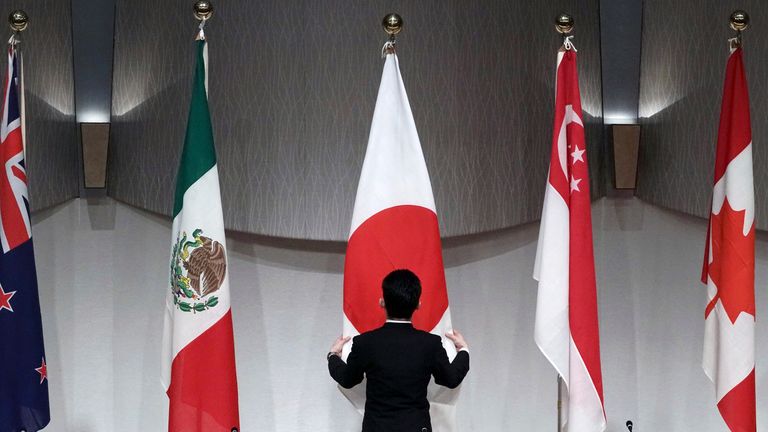The UK government has begun talks to join the trans-Pacific trading bloc, CPTPP, as part of its post-Brexit move to focus on trade outside of Europe. The International Trade Secretary, Liz Truss, opened negotiations on Tuesday morning with Japan’s Yasutoshi Nishimura, the current chair of the CPTPP.
The Comprehensive and Progressive Agreement for Trans-Pacific Partnership (CPTPP) is a trade alliance between 11 nations: Australia, Brunei, Canada, Chile, Japan, Malaysia, Mexico, New Zealand, Peru, Singapore and Vietnam. The UK formally applied to join the CPTPP in February, as the first non-founding member to do so.
The government argues that joining would strengthen economic relations with these nations in a time when the global economy is increasingly centred in the Pacific region. A statement from the British Embassy in Tokyo reads: “CPTPP is one of the largest free trade areas in the world, accounting for 13% of global GDP in 2019.” The statement continues: “This would rise to 16% with the UK’s accession, adding substantial value to this huge free trade area.”
If it is to join, the UK would be the second largest economy in the agreement, after Japan. The CPTPP chair, Yasutoshi Nishimura, tweeted their hope that Britain will “demonstrate its strong determination to fully comply with high-standard obligations… I believe that the UK’s accession request will have a great potential to expand the high-standard rules beyond the Asia-Pacific.”
As a member of the CPTPP, most trade barriers such as quotas and tariffs are removed, but the trade alliance does not intend further integration, such as a single market or customs union.
Trade minister Liz Truss believes that “This part of the world is where Britain’s greatest opportunities lie… It is a glittering post-Brexit prize that I want us to seize.”
However, the CPTPP has its problems. For example, it could undermine the UK’s environment and climate targets. Furthermore, as a member, foreign investors will have increased power to challenge UK environmental policy, due to the CPTPP’s Investor-State Dispute Settlement (ISDS). These provisions allow foreign investors, such as some of the world’s most powerful fossil fuel companies, to demand compensation over state action that has, or might, hurt the profitability of their investment.
These state actions includes climate policies, potentially creating circumstances in which the tax payer is burdened with compensating large corporations, for the profits they may have made in our country were these climate policies not in place. Not only would this punish current environmental policy, but discourage further policy that would benefit the public if it in any way limits the potential of large corporations to make a profit.
Philip English, is a member of the YCL’s Manchester Branch



